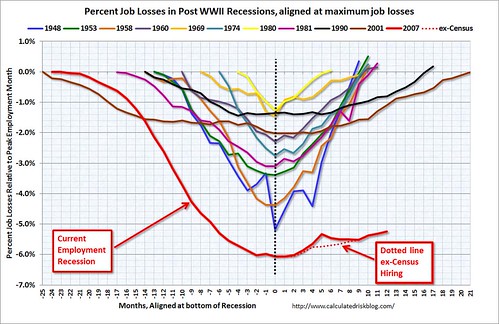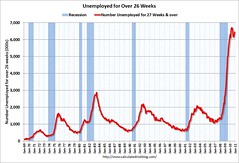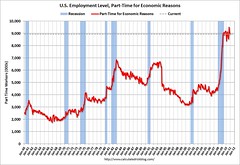The new monthly job numbers are out. They are a little bit better than they have been, but they are not very good. We added very few jobs but the unemployment rate went down. This is a function of a really bad economy in which people are so discouraged they aren't even bothering to look. So many people have given up that the labor force is actually smaller now than before the recession. We must make sure that these people are not just discarded, abandoned and marked up as a loss. They are people.
Any increase in jobs is good news. In December the economy created a net of 103,000 new jobs. Also the prior two months' numbers were revised up by 70,000. But there are real problems behind these numbers. We are more than two years into this recession, and we still are not seeing job growth that will bring the unemployment levels down anywhere near where they need to be. The stimulus worked but was not enough, and it is winding down. The new Congress has no intention whatsoever of new job-creation or infrastructure programs. And it is ending help for state and local governments that are increasingly shedding jobs.
The official unemployment rate dropped, but only because 260,000 people "left the labor force." That means they gave up looking for work. There are so many discouraged workers who are not in the labor market that any truly good news will bring a flood back into the labor force. And that will keep the unemployment number high.
Dean Baker of the Center for Economic and Policy Research writes,
The 0.4 percentage-point drop in the unemployment rate was the largest since April of 1998, but this decline may just be an aberration. The 290,000 reported gain in employment reported in the Bureau of Labor Statistic's household survey is healthy, but inconsistent with so many people leaving the labor force. It is also worth noting that average weekly unemployment claims are still averaging more than 400,000. The economy did not start generating jobs at all following the last recession until weekly claims fell below 400,000 in 2003.
[. . .] On the whole, this report does not suggest a very positive picture of the labor market going into 2011. The decline in the unemployment rate is certainly positive, but with EPOPs hovering near their low point for the downturn, the main story appears to be people giving up looking for work. Furthermore, there is no sector that appears to be experiencing robust job growth at the moment, nor any likely candidates for the near future.
Lower Pay
Many of the new jobs come with lower pay than the jobs lost. Isaiah Poole writes about this in Where Are The Breadwinning Jobs?
There isn't much cause for gloating in today's unemployment report, with the number of jobs created during December—103,000—being lower than most analysts expected. But, more critically, we're not even treading water on creating a sufficient number of "breadwinning jobs" needed to grow and sustain America's middle class.
. . . "We are now America, the downwardly mobile," wrote Harold Meyerson this week when he offered his own analysis of what has happened in the job market in recent years. The shortage of breadwinner jobs exacerbates the middle-class economic decay that began with the economic policies of the Bush administration and the conservatives in Congress. As Meyerson points out, median household income (in 2007 dollars) went from $50,557 in 2000 to $50,233 in 2007 and $49,777 in 2009.
Stocks & Profits Are Up, Nothing Else Matters
The stock market is up and corporate profits are soaring, so as far as the people who make decisions are concerned, things are better than ever. They refuse to see the problems faced by the rest of the people of the country. While waves of people are hitting the "99er" limit for receiving unemployment checks, our leadership will not do anything about it. Plutocracy has replaced democracy.
Abandoned?
According to the Economic Policy Institute, we are 7.2 million payroll jobs below the start of the recession, and that does not take into account 3.7 million more jobs that were needed just to keep up with population growth.
We face a serious risk that a plutocratic leadership will just abandon the unemployed. Corporate profits and stock prices are up, even with this level of unemployment. So the plight of so many millions of Americans is of little concern.
There is so much work that needs doing. The country's infrastructure is deteriorating, dragging down our economy's competitiveness. This represents millions of jobs that need doing -- while millions of people need jobs. But the nation's leadership instead passes tax cuts for the rich, borrowing hundreds of billions for that purpose instead of for putting people to work and maintaining the infrastructure. And in the midst of the borrow for tax cuts instead of jobs, creates deficit commissions in stead of jobs commissions.
The Charts
Here is The Chart (from Calculated Risk.)

The following two charts are from this analysis.
Unemployed over 26 weeks:
Part time for economic reasons (underemployed):
The President and Congress should recognize that stock prices and corporate profits have become separated from what the rest of the country is experiencing. "Main Street" is not recovering. People are not finding jobs. It is still a crisis. We need a jobs first economic plan.





